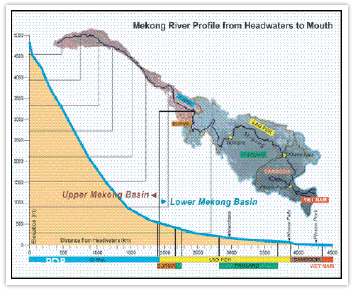2005 Progress Report
The Water Utilisation Programme
The Water Utilisation Programme (WUP) works to provide the MRC, its member states and other MRC programmes with tools to be used to improve water management for the economic and social development of the Lower Mekong Basin in an environmentally sustainable manner.

The WUP comprises four components:
- Development of computerised Basin Modelling and Knowledge Base tools, known as the MRC's Decision Support Framework, supporting basin planning and impact assessment activities of the MRC
- Drafting of Procedures for Water Utilisation to elaborate various provisions of the Mekong Agreement
- Environmental and Transboundary Impact Analysis activities providing the technical support for the procedures on flow maintenance and water quality
- Management and Institutional Strengthening
The WUP is implemented in close consultation and collaboration with the member states through a well-defined and structured series of informal and formal discussions and negotiations facilitated by the MRCS.
The WUP is entering its final year of a programme initiated in 2000. In 2005, WUP made strong progress on the legal and technical content of procedures which will improve management of flow and water quality throughout the Lower Mekong Basin.
Key achievements in 2005 included:
- Completion of the final text of the procedures regarding maintenance of flows on the mainstream. These procedures require member countries to cooperate on maintaining acceptable minimum monthly flows in the dry season; an acceptable natural reverse flow of the Tonle Sap during the wet season; and the prevention of peak flows greater than what occur naturally. Technical input to these procedures was provided through Integrated Basin Flow Management (IBFM) activities executed jointly with the Environment Programme (EP). During 2005 the first basin-wide flow assessments were completed, based on evaluation of the environmental, social and economic beneficial uses of water under flow regimes representing a range of possible future basin development activities.
- The drafting of the rules for water quality was initiated and is nearly complete. Integrated Water Quality Management (IWQM) activities, also executed jointly with the EP, provided the technical support for these rules commencing with agreement on initial water quality objectives, including criteria (indicators and targets) for domestic consumption and human contact.
- All previously approved procedures and guidelines were published and made available in the national languages of member states.
- The set-up of new WUP-FIN modelling tools, funded by Finland, to enable specific regional studies in each of the four member countries. The models have already been used to complete a study on the potential transboundary impacts of increased development activities in the basin.
- Improvement of the performance and accuracy of the MRC modelling and knowledge base tools and continuation of the Associate Modeller Programme (funded by the Global Environment Facility and implemented by the World Bank), which offers on-the-job training to four National Mekong Committee trainees. This training significantly boosts the capacity of modelling work in the basin.
- Finalisation and publication of a comprehensive hydrological report on the Lower Mekong Basin entitled: Overview of the Hydrology of the Mekong Basin. This report is intended as an introduction to the hydrology of the Mekong River, based on analysis of the most up-to-date historical data, and it provides basic insights into the flow regime of the river.
In 2006, the programme will successfully complete its present scope of work, which will include finalising both the flow maintenance and water quality procedures and related technical guidelines. It will also coordinate the second phase of the WUP-FIN modelling activities and provide post-contract support for the Decision Support Framework knowledge base and modelling tools as well as technical support to various MRC and NMC programmes.
Finally, the programme will undergo national and regional consultations in order to prepare to move into a possible next phase.
Choose a newsletter: